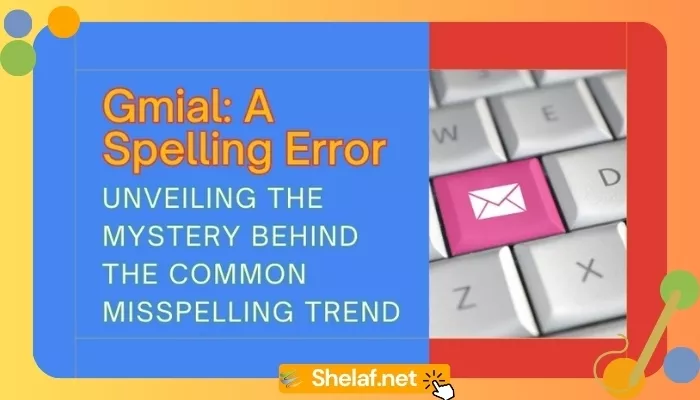Gmail, Google’s omnipresent email service, has changed communication. However, a strange quirk is the constant misspelling “GmiaL.” Why does it happen so frequently? To further comprehend this phenomenon, let’s explore the interesting realm of typos, memory, and brain idiosyncrasies. If you’re having trouble remembering the right spelling, see this guide to the most frequent Gmail misspellings and how to prevent them: Gmaik: The Most Common Gmail Misspelling (And How to Avoid It).
Contents
The Prevalence of “GmiaL”
- A Common Error: If you’ve ever typed “GmiaL,” you’re not alone. A quick search on Google Trends reveals countless instances of this misspelling across the internet. It’s a typo that transcends age, tech proficiency, and even language barriers.
- Not Just a Typo: It’s more than a fleeting error. Many people consistently type “GmiaL,” even after repeatedly seeing the correct spelling.
Unraveling the Mystery: Why We Type “GmiaL”
-
Muscle Memory and Typing Habits:
- Our fingers often develop muscle memory for common words and phrases. When we type quickly, we rely on these ingrained patterns, which can lead to errors like “GmiaL.” However, research suggests that visual feedback plays a critical role in detecting and correcting typing errors. A study titled “The role of visual feedback in detecting and correcting typing errors: A signal detection approach” published in the Science Direction examines this phenomenon in detail.
-
Cognitive Biases and Shortcuts:
- The Availability Heuristic: Our brains prefer information that is easily accessible. We regularly see the term “Gmail,” so it becomes a dominating mental connection, even when we try to recollect the correct spelling. The availability heuristic is well detailed in the article “Availability Heuristic: Examples and Effects on Decisions” on Verywell Mind.
- Top-Down Processing: We frequently see words as wholes rather than collections of letters. This can result in small typos, such as the swapped “I” and “L” in “GmiaL.” “Top-Down vs. Bottom-Up Processing” is an article on Simply Psychology that discusses top-down processing and its influence on perception.
-
The Function of Sound and Pronunciation:
- The words “Gmail” and “GmiaL” sound almost identical. When we conceive of a word, our brain concentrates on the sound, making it simple to swap letters that sound similar. This phenomena is known as phonological similarity, and research on it can be found in the National Library of Medicine article “The Critical Role of Semantic Working Memory in Language Comprehension and Production.”
-
Visual Similarity and Letter Transposition:
- The letters “I” and “L” are visually similar, especially in certain fonts. Our brains can easily transpose these letters, leading to the “GmiaL” error. Additionally, the “a” and “i” can be visually similar depending on the font.
Case Studies and Examples
- Social Media Blunders: Numerous tweets, posts, and comments feature the “GmiaL” misspelling, often leading to humorous interactions and corrections. For a deeper look at the role of Gmail in customer service, you can read “Gmail: A Customer Service Lifeline… But Beware the Digital Abyss!“
- Autocorrect Fails: Even autocorrect systems can fall victim to this error, sometimes perpetuating the misspelling instead of correcting it.
- Brand Awareness Challenge: While Google likely isn’t losing much sleep over “GmiaL,” it highlights the challenge of maintaining brand consistency in the digital age.
The Impact of “GmiaL”
- Search Engine Optimization (SEO): Spelling errors such as “GmiaL” might have an influence on SEO, making it somewhat more difficult for consumers to access relevant information regarding Gmail.
- Communication Clarity: In professional situations, persistent misspellings might reflect negatively on a person’s attention to detail. Businesses can find out how to use Gmail efficiently for customer service by reading “Gmail for Customer Service Excellence: A Comprehensive Guide for Businesses.“
Overcoming the “GmiaL” Phenomenon
- Mindful Typing: Slow down and pay attention to what you’re typing.
- Proofreading: Double-check your emails and messages before sending them.
- Spelling Aids: Utilize spelling and grammar checkers.
- Embrace the Humor: If you catch yourself typing “GmiaL,” don’t be too hard on yourself. It’s a common error with fascinating psychological roots.
Conclusion
The “GmiaL” phenomenon provides insight into the complicated interaction of language, memory, and our brains’ proclivity for shortcuts. While it may appear to be a minor typo, it highlights deeper cognitive processes and the problems of preserving correctness in the digital era. By understanding the factors that contribute to this error, we can become more mindful of typists and communicators.











